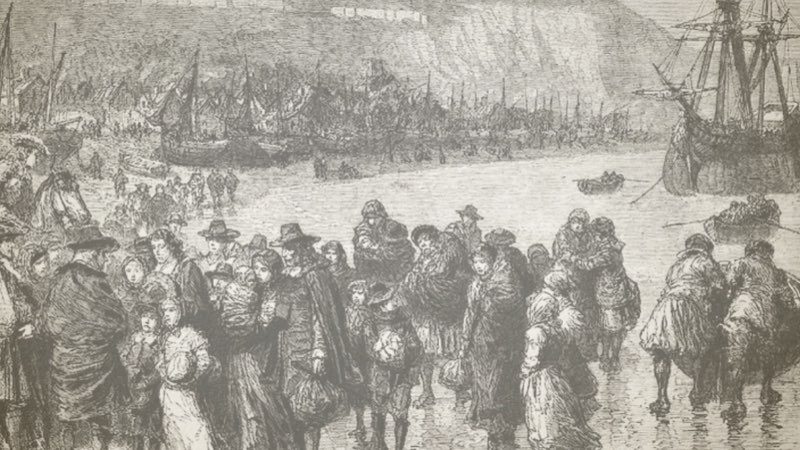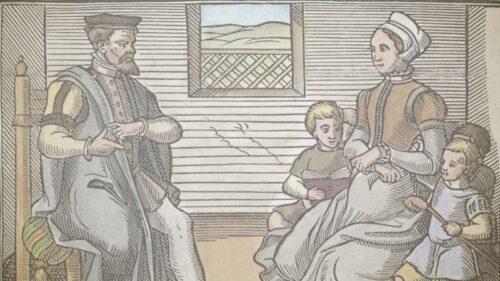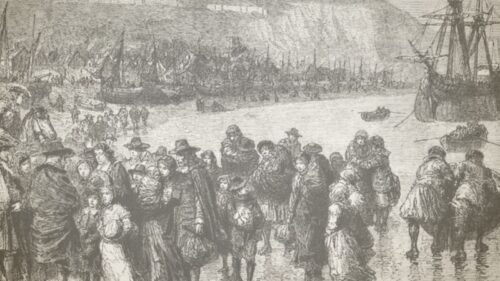
Chapter 7
Appeal to Parliament — Factum — President’s remarks — Sentence reverse — Register refuses copy of decree — Apply for redress — Return home.
The Parliament of Bourdeaux, or rather of Guienne, then held its sittings at La Reolle, and by its order we were removed to the prison of that town, which was so full that the jailer, contented with the payment of his entrance fee, allowed us to go and come on “parole” as we pleased. This promised to be a very advantageous arrangement for me, as I could thus have the opportunity of making personal application to Parliament, proving my own innocence, and exposing the injustice of the Presidency of Saintes in its true colors.
I had my Factum printed, of which the following is a true and faithful copy:
FACTUM
“JAMES FONTAINE is accused of two things. The one, of being found in the assemblies held in the wood of Chatelars, near Royan; and the other, of having been heard praying to God, in the prison of Saintes. With regard to the first accusation, it is based upon the testimony of only one witness, named Agoust, who made affidavit to having seen him at the distance of one hundred paces from his own house, and two hundred paces from the place where the assemblies were said to have been held. At the confrontation, this witness admitted that he only thought he had seen him from a window, and that, too, in the dusk of the evening, at the distance of three or four hundred paces; and upon the strength of such testimony as this, the said Fontaine has been confined four months in the prisons of Saintes, which are extremely rude in their accommodations. The charge of praying to God rested upon the evidence of four witnesses, who contradicted themselves upon cross-examination; and it appeared that the said Fontaine merely knelt down in a corner of the prison, and spoke in so low a tone that the jailer’s wife, after acknowledging that she passed within one pace of him when he was kneeling down, was not able to repeat a single word of what he had said. After the breviate of the case was completed, the Seneschal, in the most extraordinary manner, refused to judge, and the said Fontaine was obliged to take legal steps in consequence; and after four months’ delay, the Attorney General’s deputy, recognizing the injustice of the proceeding, called for further inquiry, and the sentence resulting therefrom is the subject of the present appeal. The said Fontaine has been declared guilty of contravening the King’s Edict, and has been condemned to pay a fine of a hundred livres, and declared for ever incapable of exercising the functions of candidate or minister. The said Fontaine appealed. He tendered the sum of one hundred livres, the fine imposed upon himself individually, and desired to be set at liberty. This was refused; but he has since obtained permission to go in and out upon condition of returning to the prison.
This is a brief statement of facts, and the said Fontaine now proceeds to justify his appeal. In the first place, the testimony of a single witness is not sufficient under any circumstances; and the witness in question merely testified to seeing him on the highway, and not at the place of meeting, and confessed afterwards that he only thought he had seen him. A witness, to be depended upon, should speak with certainty, and not by credit vel non credit any more than by heresay. And, furthermore, it can be proved that the said Fontaine was at Coses, distant three leagues, on the day and at the hour named by the witness.
As to the second accusation, could it, among Christians, be considered a crime to pray to God, and that, too, in the actual words dictated by our Blessed Lord to his disciples? Surely the very situation of a prisoner would be likely to make him, if a Christian, pray more fervently and frequently than ever. He could appropriate the language of the Royal Prophet and say, “Out of the depths have I cried to thee, O Lord,” and God, who is the judge of the quick and dead, will not condemn him for it, whatever man may do. In order to convict, there should be proof of words having been used that could admit of evil construction; so far from it, all that has appeared in evidence is, that he was seen on his knees in a remote corner of the prison, and one witness heard him say, “Our Father, who art in heaven.”
The said Fontaine concludes with the prayer, that this, his appeal for justice, may be favorably considered; the former decision reversed, and he be released from confinement and from all fines, costs, and damages.
MONSIEUR DE LABOURIN, Reporter.
(Signed) DUMAS, Attorney.
Presented 6th August, 1684.”
When I presented this Factum to the President of the Parliament, I said to him, “My Lord, I here present you with a true statement of facts, and if you find, upon examination, the slightest discrepancy or exaggeration when you come to compare it with the evidence which will be brought before you, I am willing not only to have the sentence of the Seneschal confirmed, but increased penalties added to it.”
He read it over with attention, and then said to me, “I can scarcely imagine that this is correct. The Seneschal could have no inducement for acting thus.”
“My Lord,” said I, “his ruling passion is the spirit of avarice, which he hides under a specious display of false zeal; he only joined me with the poor people, in the sentence, to make sure of obtaining payment of the fine and costs. I can assure you his fees of office have been levied with an unsparing hand.”
There are certain fees which are the perquisite of the reporter, who is the one, among the judges, to whom is confided the examination of the process. The fees vary in amount according to the importance of the cause. The Seneschal had an idea that our suit would be profitable, and he took care to have himself appointed reporter for it, and he made most exhorbitant charges.
The form of proceeding before Parliament is the same as before the Presidial Court.
When I entered the Hall of Justice, the Serjeant offered me the stool, as in the other Court; but I cast a look towards the President, who did me the favor to exempt me from the opprobrium. I was treated most respectfully, no unnecessary questions were asked, and I received full justice. I obtained a final decision, reversing the sentence of the Presidency of Saintes, and acquitting me entirely. My poor neighbors, for form’s sake, were banished from the province for six months. The Seneschal of Saintes was ordered to return the hundred livres that I had deposited, and he was prohibited from receiving fees on this or any future occasion, where the King was the prosecutor. Two grievous blows for the Seneschal.
It was necessary that I should obtain a copy of the decree in order to regain my liberty, and then I must exhibit the copy to the Seneschal of Saintes, to compel him to pay me back my hundred livres.
The Register was, like some of the others with whom we had to deal, very fond of money. I applied to him for a copy of the decree, and offered him eight or ten pistoles for payment. He would not let me have a single copy unless I paid him for twenty-one, which, he said, would be required, one for each prisoner. I knew, as well as he did, that one would be sufficient, and that the jailer would set us all at liberty upon exhibiting one single copy.
I preferred a complaint to my reporter, who recommended me to go and make it in person to my Lord the President; which I did, and he told me I was to command the Register, in his name, to furnish me with a copy, paying only for that single one.
I went promptly and cheerfully with this order to the Chief Register, but he was a great man who interfered little with the business of his office, and he sent me to his deputy, one Cardon, who said it was none of his business. I returned to the Chief Register, for I did not begrudge my steps, and he told me to tell Cardon, from him, to speak to the President. For several days I was kept on the move, going from cne to the other without any prospect of redress; and I then began to see the object of all this delay. I found that this day was the last upon which the Court would sit before the Christmas holidays, and the Register and his deputy knew that if Parliament had adjourned, and the Lords of Parliament were dispersed to their several homes, I should be completely in their power, I should have to pay their full demand for twenty-one copies, or remain a prisoner during the whole holidays.
I was almost in despair, Parliament had then met to move the adjournment until after the Christmas holidays, and I had neither solicitor nor advocate to help me. I determined to make a desperate effort; I wrote my grievance upon a slip of paper, and managed to get in to the hall when the doorkeeper was engaged elsewhere. I made a profound bow, said nothing, but held up my hands in an attitude of supplication towards the Lord President. Cardon was there, and called to the Serjeant to seize and expel the intruder: he hoped to have had me pushed out before I was recognized by the President; but, most fortunately, he had observed my entrance as well as Cardon, and he called out to me, “Mr. Fontaine, have you not obtained your deed yet?”
No, indeed, my Lord; what does it benefit me to have found favor in your eyes, and that you have done me justice, when it is in the power of Mr. Cardon to prevent my obtaining the necessary record of it? Parliament once adjourned, he will leave me to rot in a dungeon. My despair has made me bold enough to enter this hall unbidden, and throw myself at the feet of your Lordship, as a petitioner for simple justice.”
The President was extremely indignant, and he called out, “Mr. Cardon, how dare you disobey my orders? What have you to say for yourself, that ought to save you from being punished as you deserve?”
He began a shuffling sort of apology about not having received the instructions of the Chief Register.
I was on the point of contradicting him; but my Reporter, Mr. Labourin, who wished well to my cause, put his finger on his lips, to show me that I ought to remain silent; and I presently saw that it was the best policy, for the anger of the President was only increased by an apology that appeared to set at naught his own authority.
“And am I to understand, Mr. Cardon, that you consider an order from me a dead letter, unless it be confirmed by the Register? If you know your duty no better than that, it is, time that I should have done with you.”
Cardon was in great dismay, and he begged pardon with all humility, and assured the Parliament that he would attend to the matter immediately.
The President then addressed himself to me, and said, “Sir, if you cannot get your deed to-day, come and tell me; and when you have received it, let me know how much you have paid for it.”
I made a low bow and withdrew, very well satisfied with the success of my bold attempt.
I waited patiently near the door, to be on the spot to waylay Mr. Cardon, as soon as the Parliament was adjourned. I asked him to give me my deed, and he replied he was going home to his dinner, and I should have it after he had dined. I determined not to lose sight of him, and followed to his mansion, which he observed, and told me I had better follow his example and go and get my dinner.
“No,” said I, “I will neither eat nor drink untilI am possessed of my deed.”
I maintained my position outside of his door for about two hours; when, seeing neither him nor the deed, I knocked. A footman opened the door a very little way, and held it so that I could not possibly get in: he told me his master was out. I was not to be deceived in that way; I remained at my post, and saw several persons admitted. At last, two well-fed Franciscan friars came to the door, whom I followed in, unobserved, and keeping close in their rear, rather crouched down, I managed to get into the office; and there I waited in concealment until they had finished their business, and, as they retired, I rose to my full height, and stood like a spectre before Mr. Cardon.
“What devil placed you there?” said he.
I replied, “I entered under the auspices of the good fathers who are just gone.”
He handed me the deed, and I gave him in gold the one and-twentieth part of the sum he had demanded for furnishing the full number, and, much to my surprise, he returned to me five or six crowns.
“How is that? Are you satisfied?” said I.
“No,” said he, with much bitterness, “nor shall I be until I see you with a halter round your neck.”
“When people are hung for praying to God, I shall have reason to be afraid, and you will be able to sleep in peace.” Having given him this reply, I took the deed away with me, and presented it to the jailer, who released us from our “parol,” and we were at full liberty.
I should not have dwelt upon this subject at so great length, but for the purpose of showing you the variety of difficulties we had to contend with. Every one seemed to think he had a right to impose upon a poor Protestant, even down to a register’s clerk.
From this detail you may learn the necessity of standing up for your rights with firmness, and the duty of using every energy to overcome the obstacles in your path, instead of sitting down quietly as some indolent persons do, to complain of fatigue and rebuffs, without making an effort. Remember, God has promised his blessing to the diligent hand, as well as the upright heart.
In the course of the day, I called to take leave of my Lord the President, and to thank him for all his kindness. I then turned my steps toward Saintes, quite victorious, with the deed in my hand. I made the Seneschal refund the hundred livres already named, and once more I set foot within my own dwelling. The expenses I had incurred during my imprisonment amounted to two thousand livres.
Most of the poor people returned quietly to their own homes, and were allowed to remain there without molestation. They received contributions from charitably disposed Protestants to an amount that made ample amends for the loss of time, and injury to their families, from deprivation of their earnings, during their imprisonment.
The history of our persecution spread far and wide, and I received many letters of congratulation upon the courage and successful result of my appeal to Parliament. Amongst others, the Marquis de Rouvigny, father of Lord Galway, wrote me a complimentary letter. He had the management of much of the business of our Reformed Churches.
Mr. Benoist gives an account of our trial and imprisonment in his “History of the Edict of Nantes.” You will find it in the third part of the third volume, pages 744 and 745.
James Fontaine (1658) was the great-great-great-great-great-great-grandfather of Jared Smith (Editor of the AHB). He wrote an autobiography, the material of which was compiled and published by some of his descendants. The first publication is called, ”A Tale Of The Huguenots Or Memoirs Of A French Refugee Family (De La Fontaine)” (1838). The second publication is called, “Memoirs Of A Huguenot Family” (1872).
"A Tale Of The Huguenots Or Memoirs Of A French Refugee Family (De La Fontaine)", 1838 (Complete)
Memoirs Of A Huguenot Family, 1872 (Complete)





